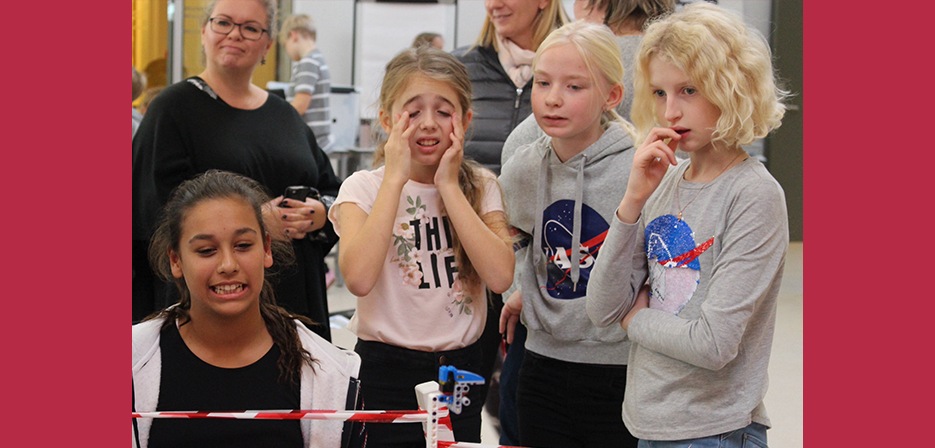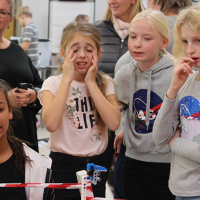

Pedagogy of Play
Cultivating school cultures that value and support learning through play
Play is central to how children learn—the way they form and explore friendships, the way they shape and test hypotheses, and the way they make sense of their world. Much is known about how play supports learning, yet little empirical research has explored what it might mean to put play at the center of formal schooling. In 2015, the Pedagogy of Play (PoP) research project began investigating the nature of playful learning in schools. Funded by the LEGO Foundation, the project focuses on three core questions: Why do educators need a pedagogy of play? What does playful learning look and feel like in classrooms and schools? How do educators set up the conditions where playful learning thrives?
The answers to these questions can be found in our book, A Pedagogy of Play: Supporting playful learning in classrooms and schools! On our book resource page you can find free PDFs of the English and translated versions, links to purchase physical copies of the book via the Lulu website, and a link to access an audiobook/podcast companion.
We began our research with the International School of Billund (ISB) in Denmark, a school whose mission is designed around learning through play. Our research with ISB inspired a working set of playful learning principles, practices, and tools; pictures of practice (stories illustrating playful learning in action); and the beginnings of a pedagogy of play framework. We also developed a research methodology for examining and enhancing playful teaching and learning. Recognizing the cultural variations of learning and play, we expanded our research to include schools in South Africa, the United States, and Colombia. In each context, we sought to understand what playful learning looks and feels like.
On the tabs of this web page, you can find more details about our research, including some key ideas, resources for teachers and administrators to develop or enhance their playful learning practices, and resources for teacher educators who wish to support pre-service or in-service teachers in cultivating playful classrooms and schools. We also invite you to explore our blog, which offers team reflections and activities, stories of playful practice, and insights and experiences from practitioner and research colleagues who support learning through play.
Resource
Resource
Resource
Resource
Resource
Resource
Resource
Since 2015, we have been investigating the relationship between play and school. A growing body of evidence demonstrates that play supports children’s social, cognitive, emotional, and physical development, and that there is a positive connection between enjoying learning and academic success. But integrating playful practices into school, or embracing play as a strategy for learning, has proven challenging. In part this is due to paradoxes that arise when play and school intersect:
- In play, children are in charge. At school, the adults typically set the agenda.
- Play can be chaotic, messy, and loud. Schools often need to be orderly and quiet.
- Play often involves taking risks. Schools aim to keep children safe.
Both statements in each bullet above are true, and both statements of each bullet should be honored. These paradoxes are the underpinning of why a pedagogy of play—a whole school approach to examining, discussing, and supporting playful learning and teaching—is critical.
Six Core Principles of Playful Learning
Based on literature reviews of learning and play, insights from educators and researchers around the globe, and practitioner action-research with playful teachers and school leaders in Denmark, South Africa, the U.S., and Colombia, our research team developed six core principles of playful learning:
- Play supports learning
- Playful learning in school requires play with a purpose
- Paradoxes between play and school add complexity to teaching and learning
- Playful learning is universal yet shaped by culture
- Playful mindsets are central to playful learning
- Supportive school cultures enable playful learning to thrive
These principles form the foundation of a pedagogy of play. You can read more about each principle in our book, linked on the Overview page.
Playful Learning Indicators
It is easier to talk about, plan for, and assess playful learning with colleagues who share an understanding of what playful learning means. Together with educators, we co-created working definitions of what playful learning looks and feels like in their own contexts. Through interviews with educators and students, observations, focus groups, study group discussions, and examining documentation of student learning, we developed site-specific, culturally relevant maps of playful learning. If you hover over the points marked on the map below, you can see these Indicators of Playful Learning for each site:
For each model, playful learning is represented at the intersection of the indicators; in other words, playful learning is likely to occur when all three indicators are present. The models are explored in depth in our working papers. Educators have used these indicators to develop a whole school approach to playful teaching and learning appropriate for their setting. Perhaps not surprisingly (after all, playful learning is universal), the models also share features across contexts. Looking across our four sites, we noticed patterns and developed a cross-cultural model of playful learning indicators.

The cross-cultural indicators provide a starting point for educators and school communities interested in exploring what playful learning looks and feels like, and how they might foster a pedagogy of play in their school. If you are interested in digging deeper or co-creating your own playful indicators, the Playful Learning Indicator Guide: A Weekly Handbook for Research Teams can be found on the For Educators tab on this website.
Playful Learning Practices & Strategies
How can educators set up the conditions where playful learning thrives? Based on extensive classroom observations and interviews across sites, consultations with key thought partners, a review of literature (including related pedagogies such as inquiry and project-based learning), and our own prior research and experiences in the classroom, we identified the following key practices and strategies that support playful learning and teaching across ages and contexts:
| Practices | Strategies |
|---|---|
| Empower learners to lead their own learning |
|
| Build a culture of collaborative learning |
|
| Promote experimentation and risk-taking |
|
| Encourage imaginative thinking |
|
| Welcome all emotions generated through play |
|
Click here for an expanded description of these practices and strategies which, along with related tools, can be found on the For Educators tab and in our book.
Playful Participatory Research
To promote playful learning for children and older learners, it’s important for the adult learning community to also embody and engage in playful learning. We developed Playful Participatory Research (PPR) as a research and professional development approach for educators to reflect on their playful practice. PPR is a form of action research in which teachers collect data, analyze results, and use the knowledge to develop or deepen playful teaching and learning in their own schools. PPR provides opportunities for teachers to play with ideas, take risks, and explore new possibilities, and it provides school communities the opportunity to come together for conversations about a pedagogy of play. You can read more here about our collaboration with the International School of Billund and the impacts of PPR. If you want to learn more and try PPR in your school, you can find a link to the Playful Participatory Research Guide: An Interactive Workbook on the For Educators tab on this website.
One of our goals is to help educators—classroom teachers, teacher leaders, and administrators—incorporate more playful teaching and learning into daily practice. Here, we offer specific tools and resources that support a pedagogy of play.
The Educator Toolbox includes an overview of the playful learning practices and strategies, and eighteen related tools appropriate for all ages and contexts. We invite you to adapt the tools (with integrity!) to fit your needs.
| Playful Learning Classroom Practice | PoP Tools |
|---|---|
| Planning for playful teaching and learning | |
| Empower learners to lead their own learning |
|
| Build a culture of collaborative learning |
|
| Promote experimentation and risk-taking | |
| Encourage imaginative thinking | |
| Welcome all emotions generated through play |
We also offer two guides and accompanying workbooks, designed for educators interested in conducting their own playful research (and research playfully!). The first is the Playful Participatory Research (PPR) Guide: An Interactive Workbook, developed by the Pedagogy of Play research team as a way to support educators’ playful learning. PPR is a type of practitioner inquiry or teacher research—research done by educators. It is a reflective and playful way for members of a learning community to explore learning through play together, through collecting and discussing data, analyzing it together, and applying what is learned. The PPR Guide provides an overview of the process, an interactive workbook to play with, and some additional resources to support the research.
The Playful Learning Indicator Guide: A Weekly Handbook for Research Teams helps educators co-create their own definition of playful learning. Modelled after the research process of Pedagogy of Play, the guide is helpful for any team of educators interested in better understanding what playful learning looks and feels like in their classrooms and school.
Welcome to the Pedagogy of Play (PoP) teacher education resource webpage. Here you will find materials for a 14-session course to introduce pre-service teacher candidates to playful learning.
These materials were created with the support, collaboration, and feedback from over 30 teacher educators from around the world. Feel free to adapt them as you see fit, using all or some of the course sessions. The material can also be adapted to use with in-service educators to promote their professional learning. Below, you will find:
- An instructor guide with detailed information about each course session
- A course syllabus that can be shared with teacher candidates
- PowerPoint slides for each course session
- Suggested Readings
- Resources, such as Activity Cards and Assignments that supplement information in the instructor guide, and a library of classroom videos from a range of age groups and geographies that are referenced in the syllabus to promote discussions of playful learning
Here are the course objectives shared with students in the syllabus:
Through this course, you will learn:
- WHY play is a core resource for learning
- WHAT play looks and feels like in different cultural contexts
- HOW educators can promote play and playful learning in schools, including practices and strategies for teaching and assessing learning through play
- To understand and address social justice and equity issues associated with learning through play with teacher research and equity-centered teaching
- To advocate for play as critical to children’s development and learning in schools
- To use Playful Participatory Research to reflect on and deepen learning through play
Students will work toward these goals by exploring and discussing theoretical and empirical literature on play, engaging in playful learning activities, and viewing examples of play from real classrooms.
Act 1 Why do we need a Pedagogy of Play?
- Through the Play Autobiography, students will begin to think about the relationship between play and learning through the lens of their personal experiences and their classmates
- Students will learn about the Principles of a Pedagogy of Play, using the hands-on Light and Shadow activity and video examples to unpack each principle
Session 1 PowerPoint Slides (PPT)
Session 1 PowerPoint Slides (PDF)
- Through reading and class lecture/discussion, your students will learn about the neuroscience research that exists to understand how learning through play affects our brains
- Through discussion, your students will learn about prominent theories about play and playful learning and understand that theories are tools that can help educators plan for and interpret playful learning
- Through the Play Theory Gameshow, your students will practice using a range of play theories to interpret video examples of children’s play
Session 2 PowerPoint Slides (PPT)
Session 2 PowerPoint Slides (PDF)
- Through reading and class lecture/discussion, students will explore how play can be a medium that supports children’s dispositions towards fairness and justice—how they must ensure playful learning experiences in school are open to all
Session 3 PowerPoint Slides (PPT)
Session 3 PowerPoint Slides (PDF)
- Knowing that students may face skepticism on the part of families, administrators, and/or colleagues about playful learning, students will explore ways to advocate for play
- Introduce Playful Participatory Research through discussion of teacher research articles
- Use an activity to learn about documentation and help students identify a research question for the semester
Act 2 What does learning through play look and feel like in different cultural contexts?
- Through readings, video, and discussion, students will learn that while there are general features, playful learning is also culturally determined
- In order to illustrate cultural variations of playful learning, students will be introduced to the indicators of playful learning from several contexts
Session 5 PowerPoint Slides (PPT)
Session 5 PowerPoint Slides (PDF)
- By sharing their Advocating for Play assignments, students will learn from and with each other about promoting playful learning
- Through readings, reflections on their play, and conversations with classmates, students will continue to explore how playful learning is influenced by culture
Session 6 PowerPoint Slides (PPT)
Session 6 PowerPoint Slides (PDF)
- Students will learn about recommendations for technology and screentime use, try out a tech-based playful learning tool, and consider what playful learning with technology looks and feels like
- Through readings and discussion, students will consider what playful remote learning involves
Session 7 PowerPoint Slides (PPT)
Session 7 PowerPoint Slides (PDF)
- Students will learn or revisit definitions of inclusion, dis/ability, and bilingualism
- Through reading, watching video examples, and discussion, students will build an understanding of what playful learning looks like in inclusive classrooms
- In inquiry groups, students will begin to share documentation with colleagues and use the Looking Playfully at Documentation protocol to guide their Playful Participatory Research
Act 3 How can we promote a Pedagogy of Play?
- Revisit key concepts in the course so far through a playful activity (mad lib)
- Introduce students to the Pedagogy of Play practices and share examples of these from classrooms
- Make connections between the local learning standards in your context and the PoP practices. Engage students in planning learning experiences using these practices for inspiration
Session 9 PowerPoint Slides (PPT)
Session 9 PowerPoint Slides (PDF)
- Today is all about learning how to scaffold and facilitate play, ensuring that learners explore and learn concepts in specific learning domains (e.g., literacy, mathematics, science) through play
Session 10 PowerPoint Slides (PPT)
Session 10 PowerPoint Slides (PDF)
- Think about how to use the learning environment to foster playful learning
- Look at examples of indoor and outdoor playful learning environments
- Consider risky play
- Connect all of this to the PoP Practices
Session 11 PowerPoint Slides (PPT)
Session 11 PowerPoint Slides (PDF)
- Take a deep look at one of the PoP Teaching Practices: Encourage Imaginative Thinking
- Learn a strategy called Storytelling and Story Acting, which was developed by Vivian Gussin Paley, and think about how to use this playful teaching approach with your learners
Session 12 PowerPoint Slides (PPT)
Session 12 PowerPoint Slides (PDF)
- To dig into some of the PoP practices and take more time to see examples of these in action
- To envision and practice using the PoP practices in current or future classrooms
Session 13 PowerPoint Slides (coming soon)
Session 13 PowerPoint Slides (PPT)
Session 13 PowerPoint Slides (PDF)
- Wrap up and celebrate the Playful Participatory Research process by sharing research processes and findings with the group













-
-
-
-
-
-
Support PZ's Reach